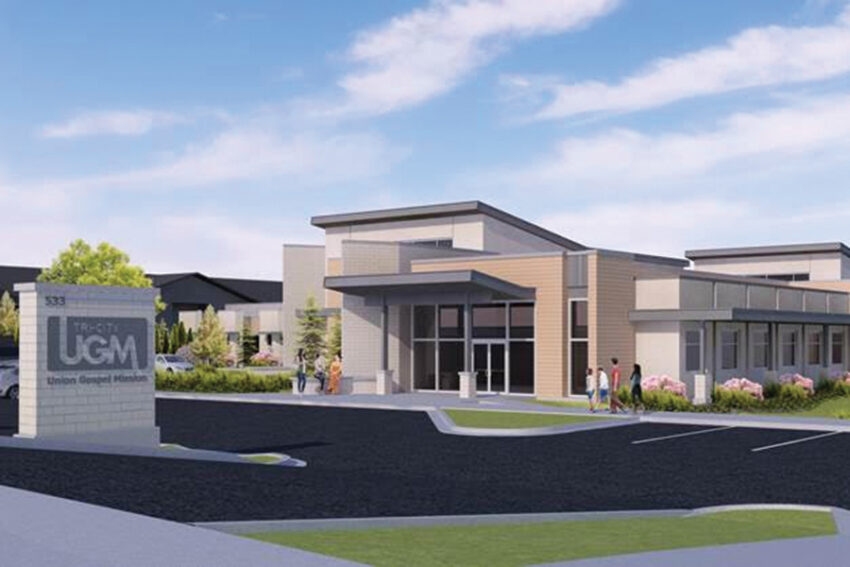As nights get longer and colder, staff at the Tri-City Union Gospel Mission shelter for women face an unenviable task.
When the shelter is full, they’re forced to turn away women and children seeking accommodations as they escape domestic violence, poverty, substance abuse and the myriad other challenges that leave them homeless and vulnerable to abuse on the streets.
With only 32 beds, it happens regularly.
“It’s not easy to say to them, ’We have no room for you,” said Debra Biondolillo, case management director for the Union Gospel Mission.
On a recent week, the east Pasco shelter turned away five women and their children and an additional three single women, Biondolillo said.
It referred them to the Housing Resource Center, which has limited hours and ability to help.
Rising demand means turn-aways are increasingly common, according to Andrew Porter, the mission’s executive director. It built a new facility for men in 2018. Now it’s the women’s turn.
The Union Gospel Mission will build a 60-person shelter for women and children in central Kennewick, where it purchased a 3.5-acre site at 533 N. Young St. in 2021. It is following the same approach it used to replace its cramped shelter for men with a modern facility in 2018.
It created a 23,000-square-foot concept for the women’s shelter, located to take advantage of the social and commercial opportunities available in central Kennewick. Porter is ready to begin raising donations to construct the building, which will cost an estimated $8.5 million.
He estimates the mission has spent about $1 million to date to purchase the land and designs.
“Let people know we haven’t forgotten about the women,” he said. “We’ve spent almost a million dollars already. That’s a lot of money to us.”
The present women’s shelter was built in 1914 as a telephone office. Volunteers fixed up a basement room as a playroom and lounge for the moms and kids who pass through.
But quarters are cramped, which makes it difficult to carry out the three R’s that drive the Union Gospel Mission’s ministry: rescue, recovery and restoration.
Those living in its facilities must use the opportunity to gain control over their lives by attending counseling sessions, helping with laundry and other chores, pursuing employment and making plans to become independent.
Attendance at worship services is mandatory and participants earn privileges by following house rules. Breaking the rules can lead to expulsion.
Rachel, who was living at the women’s shelter in late October, said she was initially turned away. She followed up and moved in when a space opened.
Her former middle-class life had evaporated, and she had been living in Walla Walla where she had no friends or family. She was pursuing sobriety, but felt alone, unsupported and embarrassed to find herself on the cusp of homelessness after a lifetime of hard work and access to money.
“It was nice to come here. On my first day, I felt comfortable,” she said. She would like to return to school, but she’s keeping her goals modest: Get a job, save money, find an apartment.
Sarah, which is not her real name, had never heard of the women’s shelter when in desperation, the Tri-City resident pleaded for help from a neighborhood pastor, saying she could no longer remain with the husband she said abused her.
“I knew about the men’s shelter, but I never knew about the women’s,” she said.
With the pastor’s help, she moved into the women’s shelter on July 22 and is working to rebuild her health and strength. The support of both staff and other residents, who encircled her with support, changed her life.
“I was really weak and run down,” she said. Her goals include finding an apartment, a job and regaining custody of her beloved dog. The shelter is more than a place to sleep and eat, she said, calling it family.
“I lay my head down at night and I don’t worry about anyone hurting me.”
Alexandra, who said she’s been on her own since she was 15, regularly turns to the shelter when she’s trying to get a new start. She has two years of sobriety, a job and a voucher for permanent housing, but intends to remain where she is to stay safe and to stay clean.
Born in Pasco, her life has been marked by tragedy and substance abuse. Her children are being adopted by their foster parents, a step she agreed to for their sakes.
She said she left school in eighth grade. The shelter helps guide her steps to becoming independent.
“We need more opportunities to sustain us,” she said. “I am hoping God can open doors for me.”
The proposed women’s shelter will have rooms for families, single women and classrooms for education and recovery programs.
Porter encouraged supporters to tour the men’s and women’s shelters, to learn about the issues that lead people to seek help.
“My job is to advocate for the women and children down there,” he said. “I believe God will provide.”
Learn more or donate at tcugm.org.
